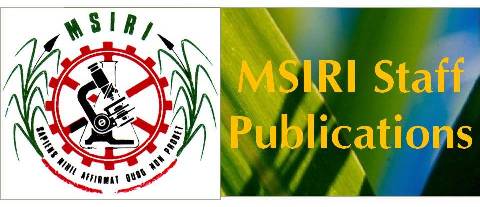Integrated agronomic practices for sustainable sugarcane production - a report on the 2006 Agronomy Workshop
| MSI07P4263 | |
| Ng Kee Kwong, K. F. | |
| Integrated agronomic practices for sustainable sugarcane production - a report on the 2006 Agronomy Workshop | |
| periodical | |
| 2007 | |
| Proc. int. Soc. Sug. Cane Technol. | |
| 26: 205-210 | |
| En | |
| En Sp Fr | |
| The 2006 Agronomy workshop was held from 22 to 26 May 2006 in Khon Kaen, thailand. The response by sugar cane technologists to the Workshop was very positive with the presence of 92 participants coming from 16 different countries (41 of them travelling from overseas). The scene for discussion and interaction among the technologists was set by 30 oral presentations and 10 posters divided under the five following specific themes: new/refined technologies for sustainable sugar cane production; ratoon yield decline and its management; soil management and the utilisation of plant residues; challenge of environmental pressure and strategy for the sugar cane grower; modelling sugar cane growth and production. It emerged at the Workshop that the key for sustainable sugar cane production lies in soil organic matter conservation. The benefits from measures that enhance and conserve soil organic matter cane, howerver, be gauged most often in the medium or long term through the improvement in soil health. Though soil organic matter conservation and build up in the soil are most critical for better management practices, it was also clear that research findings should not be considered as universally applicable and should be tested under the specific local conditions. The Workshop also provided the opportunity to acquire an overview of the sugar industry in Thailand and the status of research and development in the country. The problems that the Thai sugar industry has to overcome are not more daunting that those experienced in other sugar producing countries. With an integrated approach encompassing a more effective technology transfer and a more efficient breeding program to produce cane with improved ratooning ability and resistance to pest and diseases, the Thai sugar industry would certainly be cabaple of improving very significantly its productivity and sustainability. | |
| sugarcane technologies plant residues organic matter environment sustainability ratoon decline modelling soils cane burning minimum tillage best management practices | |
| Sugarcane: General | |
| 2007-08-06 | |
| En | |
| LIB | |
| CAT | |
| msiri |
